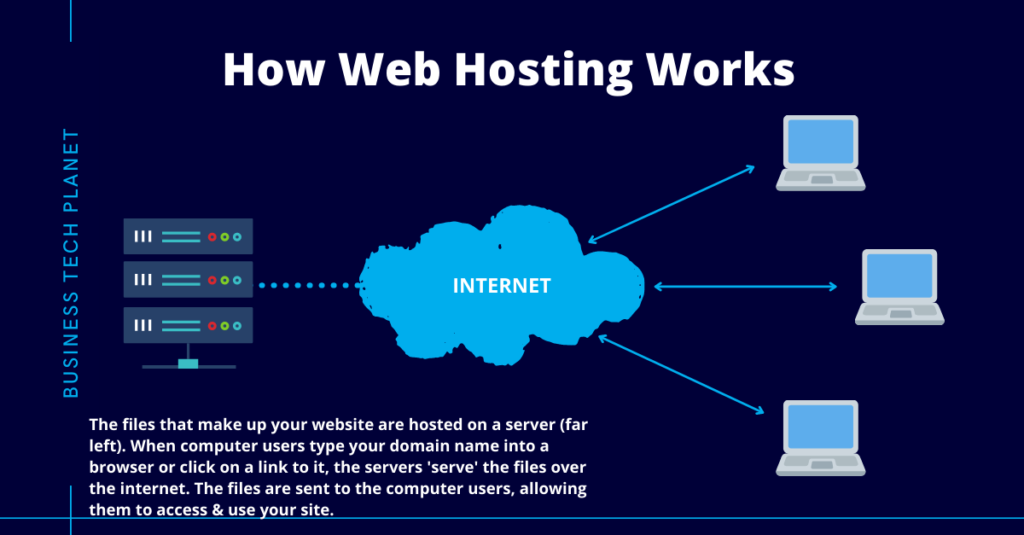If you’re currently in the process of launching your website, you’re probably beginning to realise how many immediate and ongoing costs there are. One of the ongoing costs that you’ve probably taken note of is web hosting – but is it really necessary for a website?
Web hosting is necessary if you want your website to be visible to the public. A web host company makes your website accessible to users who type your domain into their web browser or find your site using a search engine.
Without web hosting, your website will be inaccessible. Your website is just a collection of files with no home if you don’t have a hosting provider.
This blog post will act as a bit of a guide to web hosting. I’ll first answer what web hosting is and how it works.
What Is Web Hosting And How Does It Work?
Web hosting an essential service that makes your website visible to any user on the internet. It enables you to publish your website so that it can be found via typing in your domain address and search engines.
How web hosting works
When you purchase web hosting from a provider, you are essentially renting space on a server. The provider stores your website files on the server, ensuring it’s visible to internet users.
Web hosting servers are connected to the internet. Whenever someone types in your domain name or finds your site on a search engine, their device connects to the server your site is stored on and the server sends your files to their device.

Imagine renting a house on an estate. That’s very similar to how web hosting works. You are essentially renting a home for your website, and it is the hosting provider’s responsibility to ensure your site is visible to the world.
While it is possible to host your own website, it really isn’t worth the hassle or the stress. It requires a great deal in terms of resources and it can be difficult to ensure your website is always visible to users. Instead, you can use a web hosting provider.
What is a web hosting company?
A web hosting company, also known as a web host, specialises in storing sites and serving them to users. A web host provides space on their server and internet connectivity, making your site visible to web users.
The biggest web hosting companies will have large data centres containing numerous servers.
Servers are essentially computers used to store and serve files. The clue’s really in the name! In the context of web hosting, servers are used to ‘serve’ your website files to users trying to access your website.
As I previously mentioned, it is possible to host your own website should you want to. But professional web hosts have a much more advanced setup.
Reputable web hosts will have secure, well-maintained data centres containing potentially hundreds of servers. They will, depending on the package you choose, offer uptime guarantees and excellent security that you just couldn’t guarantee yourself.
Now, you’ve probably spent a lot of time and money on your website, so it’s vital that you choose a reliable hosting provider. Here are a few tips for doing so.
Tips for choosing a hosting provider
If you’re going to entrust your website with a business, you want to make sure you choose the right one!
Here are some points to consider when it comes to choosing a web host for your site.
- Support: If anything happens to your website and you need support, you need to make sure you can get it quickly. You need to know you can rely on your web host to quickly get your website up and running again. There are several things to consider here.
- The number of communication channels: If you can’t pick up the phone, are there other ways to get rapid support from your web host? For example, you probably want to choose a provider that has live chat, email, and telephone support at a minimum. Ideally, you’d pick up the phone to get support with a hosting issue, but live chat is another excellent way to get support.
- The support level you require: Depending on how important your website is, you might be able to go with a smaller, cheaper hosting company. If your site being down a couple of hours isn’t too impactful, this may suffice. However, for larger sites that are essential to a business’s success (for example, an e-commerce site) you need to choose a web host capable of offering rapid support.
- Your location: There are a lot of overseas businesses offering cheap web hosting. If they’re in a different timezone, however, what happens if your site goes down during your working hours? You might have to go without support for hours. Ultimately, you should choose a hosting company offering round the clock support.
- Web host’s specialisation: What types of website does the web host you’re looking at specialise in? For example, some web hosts specialising in hosting WordPress sites, offering special packages for websites built on that content management system (CMS). Other hosts specialise in hosting e-commerce sites, to give another example. Where possible, choose a host that specialises in hosting your type of site.
- Security: The security of your website is very important, so you must make sure you select a reliable provider. You need a web host that takes security very seriously. Some top web hosts will have examples of how seriously they take security, so that’s something to keep an eye out for.
- Reviews: If you’re going with a big, well-known web host, there will be plenty of reviews available online. Before signing up for a hosting package, search for reviews and see what the general sentiment is regarding the web host you’re looking at.
It can be difficult to find the right hosting provider, but it’s worth investing the time into this process. At the end of the day, choosing the right hosting provider is just as important as having a high-quality website.
As a general rule of thumb, I would advise choosing one of the bigger, well-known web hosts as your website host. They take security very seriously, usually have substantial resources in terms of support, and have an advanced setup capable of supporting large websites with big requirements.
On the other hand, there is an argument for going with a smaller hosting provider. For example, perhaps the business that created your website if you outsourced the website design and coding.
Smaller businesses can offer a more personal service that you just don’t get with bigger businesses. In general, you are more than just a number to smaller businesses hopefully ensuring you get a better service for the most part. However, you might not have round the clock support or any uptime SLAs and so on. You need to weigh up the pros and cons of each with your own business in mind.
Next, lets take a look at the different types of web hosting.

What Are The Different Types of Web Hosting?
Although web hosting in general always works in a very similar way, there are several types of web hosting. You’ll need to be aware of the different types so you can ensure you choose the right type of web hosting for your website.
- Shared web hosting service
- Dedicated hosting service
- Managed hosting service
- Cloud hosting service
Shared web hosting service
Shared web hosting service is an entry-level solution.
With shared web hosting, your website is placed on the same server as other websites (it could be as few as just a couple or hundreds of websites).
All of the websites hosted on the server share the same resources, such as CPU and RAM.
This is an excellent option for businesses that are just starting out with a basic website. If you don’t need dedicated resources, then this is an economical way to get your website visible to customers.
Ideal for:
- Small business websites
- Small blogs
- Personal projects
Dedicated hosting service
Dedicated hosting service is an option for businesses requiring a dedicated solution.
With a dedicated hosting service, the website owner has full control over the web server. If you choose a dedicated hosting service, only your website will be stored on the server.
The website owner is responsible for the security and maintenance of the server, as this is a self-managed solution.
Considering this is a self-managed option, you need a certain level of technical expertise to manage the server. However, if you require full control over the server that your site is hosted on, it is the best option.
Ideal for:
- Large business websites
- Large blogs
- Websites that have a lot of traffic
- Businesses wanting full management capabilities over the server their site’s hosted on
- Businesses requiring their own server without actually purchasing the hardware
Managed hosting service
A managed hosting service is somewhat similar to a dedicated hosting service. With a managed hosting service, you get your own web server. However, you are not allowed full control over it.
A managed hosting service is the ideal option for businesses requiring their own server without wanting to handle the technical side of things.
With a managed hosting service, the hosting company provides technical services including setup, configuration, technical support, monitoring, and maintenance. This saves your business all the hassle of handling the technical side of web hosting.
Ideal for:
- Large business websites
- Large blogs
- Sites with a lot of traffic
- Businesses needing dedicated resources without control over the technical elements of web hosting
- Businesses needing a simple, economical dedicated solution
Cloud hosting service
Cloud hosting is the latest innovation in web hosting. It involves numerous servers clustered together, combining resources so that sites aren’t reliant upon one server.
Cloud hosting is decentralised, which means if one piece of hardware or one site goes offline due to power disruptions, your website will not be affected.
Cloud hosting is usually relatively cost effective for businesses hosting their sites because providers can charge customers solely for the resources they’re using.
Ideal for:
- Businesses requiring a hosting solution with the most redundancy built in
- Businesses requiring a solution that will scale as their website and demands grow
